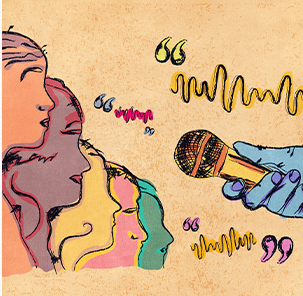Subscribe and receive the best Inkyfada podcasts straight to your mailbox.
Don't miss out! Subscribe to our newsletter to receive the latest Inkyfada podcasts.
Thanks for your inscription
Unsubscribe at any time

In this second part of episode 2, we pick up the historical narrative where we left off at the end of episode 1.
In the 30s of the 12th century, Arab armies brought down the Sassanid Persian Empire and seized its vast possessions. The Arabs took from the Byzantine Empire all its Syrian provinces and commander Amr ibn Al-As conquered Egypt in 642 AD-21H. To reach Byzantine Africa, he had to pass through Cyrenaica, where the Arabs crossed paths with the first Berber tribe, the Laouata.
A young captain from his own family, Oqba Ibn Nafaa, participated in his westward progress, which stopped at Tripoli, taken in 23H. It was Abdallah Ibn Saad, Ibn Al-As's successor at the head of Egypt, who commanded the first Arab campaign in Ifriqiya and who faced the Patrice Grégoire, aka Jerjir, whose army was six times larger than his own.
* The podcast director extends his sincere thanks to the honorable professors Adnan El Ghali and Nouri Boukhchim.
Inkyfada Podcast is the first platform entirely dedicated to original Tunisian podcasts, and was conceived by Inkyfada media in collaboration with the in-house research and development laboratory, InkyLab. Inkyfada joined the global podcast boom in 2017, when the team produced the first Tunisian audio documentary, diving deep into the belly of the El Kamour struggle taking place in the desert. Since then, Inkyfada Podcast has produced a wide variety of documentaries, investigations, and podcast series, as well as articles accompanied by music; covering a multitude of contemporary issues in order to offer an immersive and alternative podcast experience. Whilst exclusively offering audio content, the Inkyfada Podcast team upholds the same core values and principles of inkyfada.com, and is committed to producing high quality content though a dynamic and meticulous production process. In addition to the permanent team, Inkyfada podcast works closely with various journalists, artists, illustrators, musicians and other content creators in order to diversify the platform and support artistic creativity. These podcasts differ from traditional radiophonic content in that the applied production and editing process is more akin to cinematographic techniques, in addition to being web-based, downloadable and accessible on demand. Additionally, Inkyfada Podcast uniquely offers subtitles in French, Arabic and English for all audio content, the majority of which is recorded in Tunisian or in the preferred language of the speaker in question.